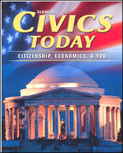
Civics Today Citizenship, Economics, & YouChapter 10: Voting and ElectionsChapter OverviewsVoting is an important right and responsibility of American citizenship. To be eligible to vote, you must be at least 18, a resident of the state for a specified period of time, and a citizen of the United States. In most states, you must also register to vote at least 25 days before the election. On Election Day, voters go to their polling place where they must offer proof of identity. In the voting booth they may be asked to use a lever machine, a punch-card, or other voting method. Even if citizens cannot get to the polls, they can still vote by absentee ballot. When the polls close, election workers count the votes and report the returns to the election board. By using exit polls and previous voting histories, some news media are able to make early predictions on election outcomes. These early calls have come under criticism in recent years. Aside from primary elections, there are also general elections, elections on issues, and special elections. For many people, the presidential election is the most important. The process has three steps: nominating candidates, campaigning, and voting. Primary elections and nominating conventions are finished by the end of the summer of a presidential election year. The campaigns are usually in full swing by early September. On Election Day, voters actually select a slate of electors who will meet in December to cast their state's electoral votes for president and vice president. Four times in our nation's history the candidate who won the popular vote did not receive the electoral majority. Many critics believe the Electoral College system should be revised or eliminated. It takes a great deal of money to run a successful campaign for a major office today. Starting in 1971 Congress tried to place some controls on campaign financing. The Presidential Election Campaign Fund gives money to each major candidate so long as he or she agrees not to accept any other direct contributions. There are also limits on the amount of money an individual may donate to a presidential candidate. The use of soft money, however, has allowed political parties to find ways around the campaign finance laws. For example, during the 2002 national elections, soft money contributions totaled about $500 million. The Bipartisan Campaign Reform Act of 2002, however, prohibited federal candidates from raising soft money. |  |















